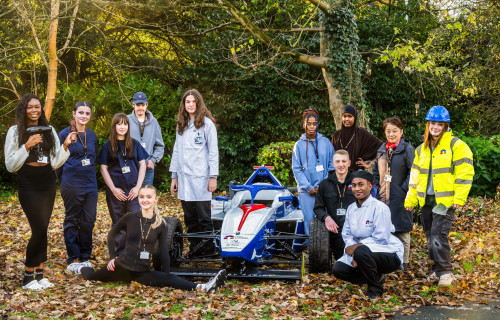T Level Foundation in Construction (Electrical) Level 2
- Ask a Question
-
Select an Option
-
2
Level
Level 2 -
Duration
1 year -
Start Date
September 2025 -
Venue
City College Norwich campus -
Course Code
A0594
What You Will Study
You will learn technical knowledge and skills for the construction and electrotechnical engineering industries. Alongside this you will develop knowledge and skills for the workplace, skills for successful study, and develop your English maths and digital skills.
Why Choose City College Norwich?
Equivalent to 3 A Levels
T Levels are equivalent to three A Levels and are allocated UCAS tariff points.
Developed with industry
T Levels have been designed with leading employers and businesses. They will provide you with the skills to progress to an apprenticeship, university or skilled employment.
Academic and practical
80% will be academic and technical study at college. 20% will be practical experience gained with an employer as part of an industry placement.
Entry Requirements
Achieve 5 GCSE's at grade 3 or above, including English Language. Achieve GCSE maths at grade 4 or above.
Course Progression
Successful completion of this course will prepare you for entry onto the T Level Building Services Engineering for Construction (Electrotechnical Engineering).
Where Your Course Can Take You
This course will help you to develop knowledge, skills and behaviour for employment in electrotechnical engineering and the construction sector.
Fees
If you are a UK or home fee status student and aged 16-18 on the 31st August before the start of your course, tuition fees are free.
Where Next?
Why Choose City College Norwich?
Equivalent to 3 A Levels
T Levels are equivalent to three A Levels and are allocated UCAS tariff points.
Developed with industry
T Levels have been designed with leading employers and businesses. They will provide you with the skills to progress to an apprenticeship, university or skilled employment.
Academic and practical
80% will be academic and technical study at college. 20% will be practical experience gained with an employer as part of an industry placement.
Similar Courses
T Level Foundation in Construction (Plumbing) Level 2
Level 2, Full Time, 1 year
Delivered at City College Norwich campus
T Level: Building Services Engineering (Plumbing) Level 3
Level 3, Full Time, 2 years
Delivered at City College Norwich campus
T Level: Building Services Engineering (Electrical) Level 3
Level 3, Full Time, 2 years
Delivered at City College Norwich campus
T Level: Surveying and Design for Construction and the Built Environment Level 3
Level 3, Full Time, 2 years
Delivered at City College Norwich campus
Latest News
Norfolk’s largest college of further education, comprised of City College Norwich, Easton College and Paston College, has received a ‘Good’ rating from Ofsted in its latest inspection.
Read more